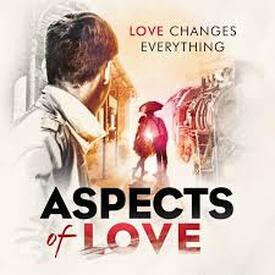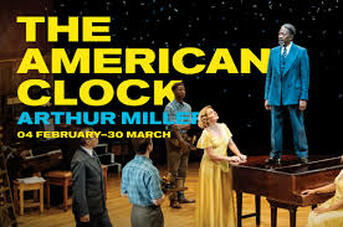 My Mixed Day at MTFest: The Assassination of Katie Hopkins & Soapdishby Randi / February 20, 2020
My Mixed Day at MTFest: The Assassination of Katie Hopkins & Soapdishby Randi / February 20, 2020The Wedding Singer & London Theatre’s Jewish Problem
London theatre has a Jewish problem. Whether the fault of creative teams, prejudice in the community and thus audiences, or a mix of both (it’s both), there’s an obvious ‘othering’ happening that feels offensive and demoralizing. Suffice it to say, I’m tired. Ain’t you tired Miss Hilly? I recently saw The Wedding Singer – a show I loved when I saw it on Broadway – and had to leave at the interval. I NEVER do that. (Okay, once.) (I mean one other time; this isn’t a Simpsons thing.) I felt ridiculed and ridiculous, with everyone around me in on a joke that is not funny. And I realized that this problem that I’ve been noticing in tiny bits and pieces is larger than I wanted to believe.
As we saw with last season’s Falsettos debacle, many productions fail to make a concerted effort to ensure that Jewish voices are involved with Jewish content. Not to start playing an unwinnable battle of the minorities, but you would never see a production of e.g. The Normal Heart without gay men involved, or The Inheritance. Or Falsettos! And this isn’t only about the acting talent, because yes, it’s the job of actors to play other identities, like Scarlett Johansson and her tree. It’s about having representation in the creative process, whether onstage or off, someone in the room to speak up, to ensure that representation onstage isn’t problematic or insulting. I didn’t support last season’s Falsettos by seeing it, but according to some people who did go, it was indeed insulting.
If it was anything like the Bar Mitzvah scene of The Wedding Singer, I’m glad I didn’t go. In this show, based on the great Adam Sandler movie, the lead needs a break from singing at weddings, and the scene changes to a Bar Mitzvah. It’s semi-funny in the movie because of Sandler and the content of the scene. But here, presenting the scene of a Bar Mitzvah was the joke in itself. As soon as men dressed in traditional Hasidic black suits and vests and hats come out, the audience roars. It doesn’t matter whether it’s funny that Robbie now has to change his act or do things he’s not used to doing – the joke was clearly Judaism. You could barely hear the lines or music because the audience was laughing at the pure visuals of Jewish men in their suits and payot (yes, they wore fake payot). That was the punch line. I felt my entire body burning with anger, as well as shame. And it got worse: the feature of this new act was Robbie’s queer keyboardist (I could write a whole nother piece on how offensively homophobic the direction around this character and everything else slightly queer was and how it was used for weird cheap laughs (and this was hundo p a right-wing crowd laughing at not with)) singing Hebrew prayers to the tune of an ’80s song.
I don’t remember whether this is done in the movie or the original production, but even if it was, it does not go over well here. Comedy has different effects on different crowds and communities, and you can tell when it’s good natured. Here, it is pure mockery of the sound of the Hebrew language and prayers, amid the sheer look of Jewish people as a punch line. In the movie, Sandler is a known Jewish performer whose comedy has the ability to poke good-natured fun at his culture. Here, it wasn’t good-natured, it was ridicule, and the laughter around me was based in contempt, which is why I left. (The production isn’t very good so I wasn’t heartbroken to leave – the pacing is about twice as slow as it should be, like the directorial metronome is broken, which makes all the actually good parts of the show fail.) Also, just because something plays appropriately in New York does not mean it will here. You have to be cognizant of the differences in the communities. In a Broadway theatre, you’re surrounded by Jews, and Jewishness is part of New York culture, especially in the theatre. In the UK, Jews are still considered rare, outsiders, and blamed for all sorts of things (like Labour losing). And there aren’t that many. In London, I was for sure the only Jewish person in the audience at my performance of Wedding Singer, and I wasn’t even surprised. Productions have to be aware of how something will play in different places and think about whether it works or not.
Falsettos wasn’t the start to the problem, and clearly not the end. I’ve noticed this in many shows over the past few years, and I’m new. The last production of Caroline, or Change was my first shocking moment. There’s a line in the show where Caroline says to her young Jewish charge that his people burn in hell. On Broadway, this line was met with a kind of hushed “oh shit” reaction, like wow that was dark, and cruel. In London, it was met with a hearty chuckle. Not a nervous laugh, a real laugh. If that doesn’t show how differently the same thing can play in the two cities and how important it is to make sure you have someone in the room (Caroline had no Jews) to account for potential offensive representation, then I don’t know what to tell you.
Recent (and great) productions like Rags at the Park Theatre and Leopoldstadt (review next week) at Wyndham’s are promising in their inclusivity and representation, although the latter still had a few very strange moments of laughter when I saw it. I am still continually surprised at what London audiences will laugh at. And yesI have a different sense of humor as an American, but sometimes it’s not that. Sometimes the laughter is quite troubling (like in Caroline and parts of Appropriate). We know that anti-Semitism is just as strong as ever in this country (and around the world), and that’s something to be aware of when you are creating art that involved Jews or Jewishness. My horror at The Wedding Singer may seem misplaced or overblown to you, but that show’s missteps are symptoms of a much larger problem in British theatre and the country itself.






1 Comment
And a problem it is . Damn what a world we live in.
I guess love is love is love has no meaning in London theater .
Well written 😍
Comments are closed.